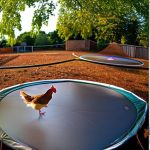Urban chicken keeping in Honolulu has become increasingly popular in recent years. More and more city dwellers are discovering the joys of raising chickens in their backyard, and for good reason. Not only do chickens provide fresh eggs, but they also offer a sustainable way of living and educational opportunities for both children and adults.
Personally, I have been raising chickens in the city for the past five years and it has been a rewarding experience. Not only do I enjoy the daily routine of caring for my flock, but I also appreciate the connection to nature that it provides. There is something special about being able to step outside my door and collect fresh eggs each morning.
Key Takeaways
- Urban chicken keeping is becoming increasingly popular in Honolulu.
- It is important to be aware of the legal considerations and regulations for raising chickens in the city.
- Selecting a breed of chicken that is well-suited to Honolulu’s climate is crucial for their health and well-being.
- Proper housing and feeding practices are essential for keeping backyard chickens healthy and happy.
- Predator prevention strategies are necessary to protect urban chickens from harm.
Legal Considerations
Before embarking on your urban chicken keeping journey, it is important to familiarize yourself with the zoning laws and regulations in your area. In Honolulu, there are specific guidelines that must be followed when keeping chickens in a residential area. These guidelines typically include restrictions on the number of chickens allowed, coop size and design requirements, and setback distances from neighboring properties.
In addition to zoning laws, you may also need to obtain a permit to keep chickens in your backyard. This process usually involves submitting an application, paying a fee, and having your property inspected to ensure it meets the necessary requirements.
Another important consideration is noise ordinances. While chickens are generally not as noisy as other animals, such as dogs, they can still create some noise, especially during the early morning hours when they are most active. It is important to be mindful of your neighbors and ensure that your chickens are not causing any disturbances.
Choosing the Right Breed
When it comes to choosing the right breed of chicken for your urban backyard, there are several factors to consider. First and foremost, you will want to choose a breed that is well-suited to the climate in Honolulu. The hot and humid weather can be challenging for some breeds, so it is important to select chickens that can tolerate these conditions.
Another important consideration is the egg-laying abilities of the breed. If you are primarily interested in raising chickens for their eggs, you will want to choose a breed that is known for its high egg production. Some popular egg-laying breeds include the Rhode Island Red, Leghorn, and Australorp.
Temperament is also an important factor to consider, especially if you have children or other pets. Some breeds are known to be more docile and friendly, while others can be more skittish or aggressive. It is important to choose a breed that fits well with your family and lifestyle.
Housing Requirements
Providing adequate housing for your chickens is essential for their health and well-being. The size and design of the coop will depend on the number of chickens you plan to keep. As a general rule of thumb, each chicken should have at least 4 square feet of space inside the coop and 10 square feet of outdoor space.
Proper ventilation and insulation are also important considerations, especially in a hot and humid climate like Honolulu. Good airflow will help prevent the buildup of moisture and ammonia, which can lead to respiratory issues in chickens. Insulation can help regulate the temperature inside the coop, keeping it cooler in the summer and warmer in the winter.
Nesting boxes and roosts are also essential components of a chicken coop. Each chicken should have access to a nesting box where they can lay their eggs in privacy. Roosts provide a place for chickens to perch at night, which is their natural instinct. It is important to provide enough roosting space so that each chicken has enough room to comfortably sleep.
Feeding and Nutrition
Feeding your chickens a balanced diet is crucial for their health and egg production. In Honolulu, there are several types of feed available that are specifically formulated for chickens in this climate. These feeds typically contain a mix of grains, vitamins, and minerals to meet the nutritional needs of your flock.
In addition to their regular feed, chickens also enjoy a variety of treats and snacks. Some popular options include fruits, vegetables, and mealworms. It is important to remember that treats should only make up a small portion of their diet and should not replace their regular feed.
Watering requirements are also important to consider. Chickens need access to fresh, clean water at all times. In a hot climate like Honolulu, it is important to regularly check and refill their water containers to ensure they stay hydrated.
Health and Hygiene Practices

Keeping your chickens healthy and practicing good hygiene is essential for their well-being. In Honolulu, there are several common health issues that chickens may face, including heat stress, mites, and respiratory infections. It is important to be vigilant and regularly check your flock for any signs of illness or distress.
Cleaning and disinfecting the coop on a regular basis is also important for preventing the spread of disease. This involves removing old bedding, scrubbing surfaces with a mild detergent, and applying a disinfectant to kill any remaining bacteria or parasites.
Regular health checks and preventative care are also important for keeping your flock healthy. This includes checking for any signs of illness or injury, trimming their nails and beaks if necessary, and providing regular vaccinations or deworming treatments as recommended by a veterinarian.
Predator Prevention Strategies
In Honolulu, there are several common predators that may pose a threat to your chickens, including rats, mongoose, and feral cats. It is important to take measures to protect your flock from these predators.
Coop security measures can include installing sturdy fencing around the perimeter of the coop, burying wire mesh underground to prevent digging predators from gaining access, and securing doors and windows with locks or latches.
Another consideration is whether to allow your chickens to free-range or keep them confined to a run. Free-ranging chickens have the opportunity to forage for insects and other natural food sources, but they are also more vulnerable to predators. Confined chickens are safer from predators, but they may require more enrichment and stimulation to prevent boredom.
Benefits of Raising Chickens in Honolulu
There are numerous benefits to raising chickens in an urban environment like Honolulu. One of the most obvious benefits is the availability of fresh eggs. There is nothing quite like collecting eggs from your own backyard and knowing exactly where they came from.
Raising chickens also offers a sustainable way of living. Chickens can help reduce food waste by eating kitchen scraps and turning them into nutrient-rich compost. They also provide natural pest control by eating insects and other pests that may be present in your garden.
In addition to the practical benefits, raising chickens can also be a great educational opportunity for both children and adults. It teaches responsibility, empathy, and a connection to nature. Children can learn about the life cycle of chickens, where their food comes from, and the importance of caring for animals.
Challenges of Raising Chickens in an Urban Environment
While there are many benefits to raising chickens in an urban environment, there are also some challenges to consider. One common challenge is noise complaints from neighbors. While chickens are generally not as noisy as other animals, such as dogs, they can still create some noise, especially during the early morning hours when they are most active. It is important to be mindful of your neighbors and take steps to minimize any disturbances.
Limited space is another challenge that urban chicken keepers may face. In a city like Honolulu where yard sizes can be small, it is important to carefully plan and utilize the available space efficiently. This may involve using vertical space for roosts or nesting boxes, or even considering a smaller breed of chicken that requires less space.
The potential for predators is another challenge to consider. In an urban environment, predators such as rats, mongoose, and feral cats may pose a threat to your flock. It is important to take measures to protect your chickens and ensure their safety.
Resources for Urban Chicken Keepers in Honolulu
Fortunately, there are many resources available for urban chicken keepers in Honolulu. Local chicken groups and organizations can provide valuable information and support. These groups often hold workshops and events where you can learn from experienced chicken keepers and connect with others who share your interest.
Feed and supply stores are another valuable resource. These stores typically carry a wide range of chicken feed, supplies, and equipment. The staff can also provide advice and guidance on the best products for your specific needs.
Online resources and forums are also a great way to connect with other chicken keepers and access a wealth of information. There are numerous websites and forums dedicated to urban chicken keeping where you can ask questions, share experiences, and learn from others.
Raising chickens in an urban environment like Honolulu can be a rewarding experience. Not only do chickens provide fresh eggs, but they also offer a sustainable way of living and educational opportunities for both children and adults. While there are legal considerations, housing requirements, and health and hygiene practices to consider, with proper planning and care, urban chicken keeping can be a fulfilling and enjoyable hobby. Personally, I have found great joy in raising chickens in the city and would encourage others who are interested to give it a try.
If you’re wondering if you can keep chickens in Honolulu, you might also be interested in learning how to care for goslings. Poultry Wizard has a helpful article on breeding geese and providing proper care for goslings. Whether you’re a beginner or an experienced poultry keeper, this article will provide you with valuable insights and tips. Check it out here.
FAQs
Can you keep chickens in Honolulu?
Yes, it is legal to keep chickens in Honolulu, but there are certain regulations that must be followed.
What are the regulations for keeping chickens in Honolulu?
According to the City and County of Honolulu, residents are allowed to keep up to five chickens on their property as long as they are kept in a coop or enclosed area and are not allowed to roam freely.
Do I need a permit to keep chickens in Honolulu?
No, a permit is not required to keep chickens in Honolulu as long as the regulations are followed.
What types of chickens are allowed in Honolulu?
There are no specific restrictions on the types of chickens that can be kept in Honolulu, but it is recommended to choose breeds that are well-suited to the climate and environment.
What are the benefits of keeping chickens in Honolulu?
Keeping chickens can provide a source of fresh eggs, fertilizer for gardens, and can be a fun and educational hobby for families.
Are there any downsides to keeping chickens in Honolulu?
Some potential downsides include noise from crowing, odor from chicken waste, and the possibility of attracting pests such as rats or flies. It is important to properly maintain the coop and keep it clean to minimize these issues.
Meet Walter, the feathered-friend fanatic of Florida! Nestled in the sunshine state, Walter struts through life with his feathered companions, clucking his way to happiness. With a coop that’s fancier than a five-star hotel, he’s the Don Juan of the chicken world. When he’s not teaching his hens to do the cha-cha, you’ll find him in a heated debate with his prized rooster, Sir Clucks-a-Lot. Walter’s poultry passion is no yolk; he’s the sunny-side-up guy you never knew you needed in your flock of friends!







